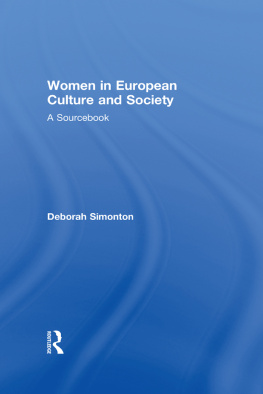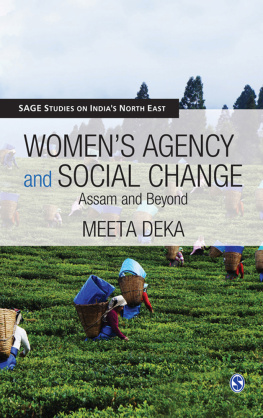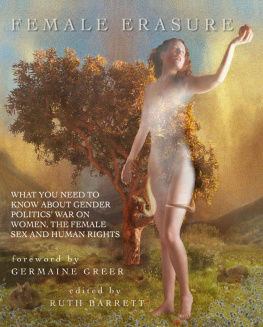Female Agency in the Urban Economy
This innovative new book is overtly and explicitly about female agency in eighteenth-century European towns. However, it positions female activity and decisions unequivocally in an urban world of institutions, laws, regulations, customs and ideologies. Gender politics complicated and shaped the day-to-day experiences of working women. Town rules and customs, as well as police and guilds regulations, affected womens participation in the urban economy: most of the time, the formally recognized and legally accepted power of womenwhich is an essential component of female agencywas very limited. Yet these chapters draw attention to how women navigated these gendered terrains. As the book demonstrates, exclusion is too strong a word for the realities and pragmatism of womens everyday lives. Frequently guild and corporate regulations were more about situating women and regulating their activities, rather than preventing them from operating in the urban economy. Similarly corporate structures, which were under stress, found flexible strategies to incorporate women who through their own initiative and activities put pressure on the systems. Women could benefit from the contradictions between moral and social unwritten norms and economic regulations, and could take advantage of the tolerance or complicity of urban authorities towards illicit practices. Women with a grasp of their rights and privileges could defend themselves and exploit legal systems with its loopholes and contradictions to achieve economic independence and power.
Deborah Simonton is Associate Professor in History, University of Southern Denmark and leads the Gender in the European Town Network.
Anne Montenach is Associate Professor of Early Modern History at the Aix-Marseille University.
Routledge Research in Gender and History
1The Womens Movement and Womens Employment in Nineteenth Century Britain
Ellen Jordan
2Gender, Sexuality and Colonial Modernities
Edited by Antoinette Burton
3Womens Suffrage in the British Empire
Citizenship, Nation and Race
Edited by Ian Christopher Fletcher, Laura E. Nym Mayhall and Philippa Levine
4Women, Educational Policy-Making and Administration in England
Authoritative Women Since 1800
Edited by Joyce Goodman and Sylvia Harrop
5Women, Gender and Labour Migration
Historical and Global Perspectives
Edited by Pamela Sharpe
6Women, Accounting, and Narrative
Keeping Books in Eighteenth-Century England
Rebecca Elisabeth Connor
7The Educated Woman
Minds, Bodies, and Womens Higher Education in Britain, Germany, and Spain, 18651914
Katharina Rowold
8Political Women
The Womens Movement, Political Institutions, the Battle for Womens Suffrage and the ERA
Alana S. Jeydel
9Women, Education, and Agency, 16002000
Edited by Jean Spence, Sarah Jane Aiston, Maureen M. Meikle
10Gender, Migration and the Public Sphere, 18502005
Edited by Marlou Schrover and Eileen Janes Yeo
11Across the Religious Divide: Women, Property, and Law in the Wider Mediterranean (ca. 13001800)
Jutta Gisela Sperling and Shona Kelly Wray
12Gender, Power, and Military Occupations
Asia Pacific and the Middle East since 1945
Edited by Christine de Matos and Rowena Ward
13The Schooling of Girls in Britain and Ireland, 18001900
Jane McDermid
14Gender in Late Medieval and Early Modern Europe
Edited by Marianna G. Muravyeva and Raisa Maria Toivo
15The Political Worlds of Women
Gender and Politics in Nineteenth Century Britain
Sarah Richardson
16Men After War
Edited by Stephen McVeigh and Nicola Cooper
17Female Agency in the Urban Economy
Gender in European Towns, 16401830
Edited by Deborah Simonton and Anne Montenach
First published 2013
by Routledge
711 Third Avenue, New York, NY 10017
Simultaneously published in the UK
by Routledge
2 Park Square, Milton Park, Abingdon, Oxon OX14 4RN
Routledge is an imprint of the Taylor & Francis Group, an informa business
2013 Taylor & Francis
The right of the editors to be identified as the authors of the editorial material, and of the authors for their individual chapters, has been asserted in accordance with sections 77 and 78 of the Copyright, Designs and Patents Act 1988.
All rights reserved. No part of this book may be reprinted or reproduced or utilised in any form or by any electronic, mechanical, or other means, now known or hereafter invented, including photocopying and recording, or in any information storage or retrieval system, without permission in writing from the publishers.
Trademark Notice: Product or corporate names may be trademarks or registered trademarks, and are used only for identification and explanation without intent to infringe.
Library of Congress Cataloging-in-Publication Data
Female agency in the urban economy : gender in European towns, 1640-1830 / edited by Deborah Simonton and Anne Montenach.
p. cm. (Routledge research in gender and history ; 17)
Includes bibliographical references and index.
1. WomenEuropeEconomic conditions. 2. WomenEurope Social conditions. 3. Cities and townsEuropeHistory. 4. Sex roleEuropeHistory. I. Simonton, Deborah, 1948 II. Montenach, Anne.
HQ1587.F445 2013
305.42094dc23
2012043931
ISBN: 978-0-415-53729-2 (hbk)
ISBN: 978-0-203-11052-2 (ebk)





